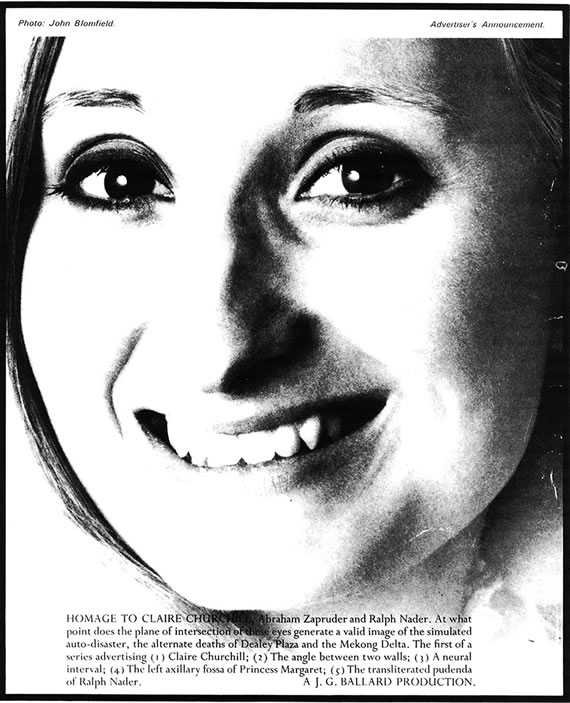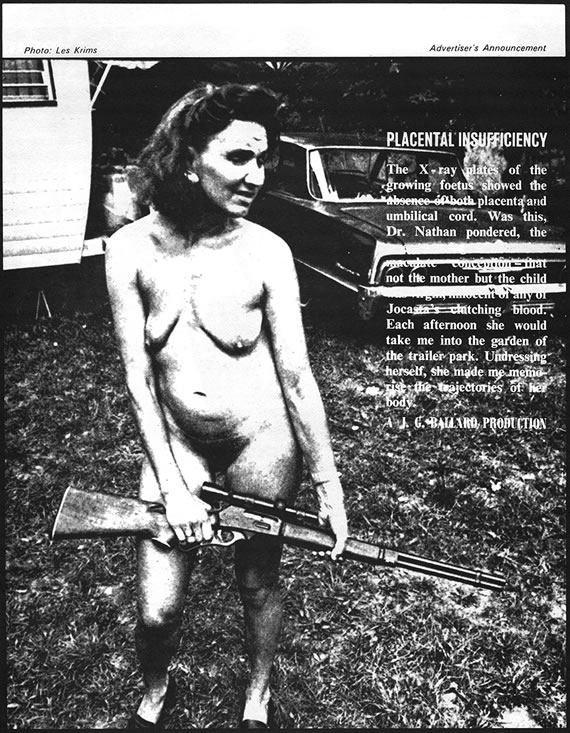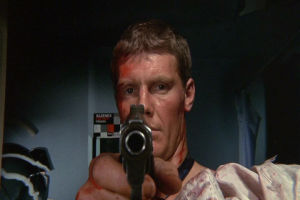
Between 1967 and 1970 J.G. Ballard placed five ‘advertiser’s announcements’ in Ambit, New Worlds and various continental alternative magazines. Although he was the editor at Ambit and heavily involved in New Worlds he paid the going rates out of his own pocket. Ballard stated that he wanted to eventually place them in Vogue, Paris-Match and Life magazines and even applied for an Arts Council grant to provide the necessary funding, but the idea was summarily rejected by the council. Ballard believed that the refusal was occasioned by their sniffy attitude towards advertising as an art-form: still the hesitancy to pony up public funds is understandable on several counts. Would those august publications have published the adverts considering their bizarre and controversial nature? Is advertising a suitable area for an Arts Council grant? And most pertinently of all, what exactly is Ballard selling?
The adverts feature a black and white image of a woman; the first and final photographs are of his partner Claire Churchill, later Walsh, the second is a still from Steven Dworkin’s film Alone about a woman masturbating, the third is a photograph of a woman in bondage gear that his friend the British Pop Artist Eduardo Paolozzi took and the fourth is by Les Krims; with accompanying text taken and on occasion somewhat re-worked from various chapters of The Atrocity Exhibition. As always with Ballard the motivation and effect is ambiguous. The use of the Situationist International technique of détournement would appear to place them as satires, but Ballard always had a tendency to embrace what was commonly held in contempt by the establishment. Regardless of their overt meaning we can be sure that their latent manifestation is of a deeply subversive nature.






I was just reading about these in Extreme Metaphors – great to see the visuals!
LikeLiked by 1 person
Thanks C.R. I am on a bit of a Ballard kick at the moment, I posted on The Atrocity Exhibition, so I thought I would share them. As always with Ballard they are absorbing but baffling. Extreme Metaphors is fantastic, he was so public, always ready for an interview, yet remains so mysterious. Does the angle between two walls have a happy ending? Indeed.
LikeLiked by 1 person
I think his fiction is something that you just ‘get’ intuitively. The more you try to intellectualise about it, the fuzzier the edges become. He had a unique way of speaking to directly to the subconscious, I think, and that could be extremely disturbing.
LikeLiked by 1 person
Yes I think he succeeds in his attempt at showing the latent manifestations of the modern world. I know that time has moved on but the reality is essentially Ballardian now. He is criticized for his characterization and dialogue but for me you get so much more in their place.
LikeLiked by 1 person
I think more emphasis on characterisation would separate the individuals from the landscape, and as far as I can tell, their merging and interchanging with it was the whole point.
LikeLiked by 1 person
Absolutely…the rules are different for fantastic fiction as well…Alice is a typical Victorian Miss, Gulliver is an Everyman, extraordinary events need to happen to ordinary people to better emphasis the events. In The Atrocity Exhibition particularly the inner and outer realms have changed places.
LikeLiked by 1 person
I think The Atrocity Exhibition is my favourite of his works for that reason. Something really clicked for me the first time I read it.
LikeLiked by 1 person
Yes it is brilliant and I have read it many times but I don’t think I have got anywhere near to the bottom of it. It is inexhaustible.
LikeLiked by 1 person
This is fascinating. Makes me want to fill in the, sadly sizable, gaps of my Ballard reading. I didn’t know he was a friend of Paolozzi. I was just at an exhibition of his at Edinburgh. At great artist.
LikeLiked by 2 people
Yes they were good friends, Ballard owned three of his works and they worked on Ambit together. Ballard is a special favourite of mine and I have written about him quite a lot. Thank you Mr Burton.
LikeLiked by 1 person
This is fascinating and baffling. I enjoy the work of Ballard, a brilliant visionary.
LikeLiked by 2 people
One of the few British visionaries. Obviously I am a keen admirer, though sometimes I wonder what his aims are. Was he a psychologist, prophet, provocativeur? This is completely baffling but thought provoking I hope.
LikeLiked by 2 people
Your subjects are always thought provoking, intriguing, and most enjoyable.
LikeLiked by 1 person
Thank you…I do stray sometimes but hopefully not into too dubious ground.
LikeLiked by 1 person
Little danger of that I’m sure.
LikeLiked by 1 person
I hope not though I do waver a lot.
LikeLiked by 1 person
I read another article on this and remember the tagline:
‘What exactly is he trying to sell?’
I too remain baffled!
LikeLiked by 1 person
The advertisements do beg this question, after all there is always a product, that’s the whole point of advertising. We both remain baffled. Thank you for the comment, they are always appreciated.
LikeLike
What an extraordinary idea. I’m not even sure what to say. So fascinating!
LikeLiked by 1 person
Ballard had a very odd way at looking at things. Fiction as a branch of neurology? Now that you mention it Jim it kind of makes sense.
LikeLiked by 1 person
Kind of. If you can even make sense of his sentences. Nevertheless it’s totally mind bending and imagination stretching. Which I can thoroughly endorse
LikeLiked by 1 person
Ballard studies to be a psychiatrist which involved in those days becoming a medical graduate. He spent two years dissecting a corpse then quit. It is always quoted as being part of the reason why he was so detached, cool and clinical in his prose. A very wayward imagination that can be witnessed in numerous books.
LikeLiked by 1 person
The psychiatrist is still a medical doctor with a speciality. A psychologist doesn’t have a medical degree however. Two years on a cadaver would certainly have an effect
LikeLiked by 1 person
Yes I think that back then though you first had to qualify as a medical doctor then study psychiatry afterwards, I think anyway. Detached, cool and clinical he definitely was.
LikeLiked by 1 person
The medical background though… if he quit was he really so detached? Perhaps outwardly and in the ways it informed his writing. Unless of course the dissection was becoming tedious
LikeLiked by 1 person
In The Kindness of Women, one of his autobiographical fictions he said that he become attached to the female corpse who he picked because of the resemblance to his mother and when he had finished dissecting he decided to quit. He was a bit of a self mythologer though. His prose style in The Atrocity Exhibition is remarkably detached.
LikeLiked by 1 person
True or not it makes for a great story.
LikeLiked by 1 person
And for a writer that’s all that matters.
LikeLiked by 1 person
Indeed
LikeLiked by 1 person
Intense visualisation, amazing.
LikeLiked by 1 person
He definitely looked at the world in a very strange, glazed way. Thank you enjoyed.
LikeLiked by 1 person
Would be interested to know if this was a true story about his Mother? Of course having a medical background does change the mental detachment to the human body. Interesting topic, you certainly have a very wide knowledge and thank you for bringing this to my attention, as always Mr Cake, you left the reader wondering.
LikeLiked by 1 person
A fair amount of writers have a medical background. Chekhov, Maupassant, Maugham, Flaubert, and of course quite a fair number of Surrealist including the Pope himself, Andre Breton.
LikeLiked by 1 person
Thank you Mr Cake.
LikeLiked by 1 person